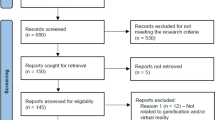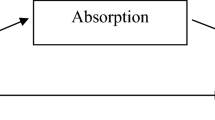Abstract
This paper evaluated a novel digital game for mindfulness training and assessment. The Interactive Mindfulness Program and Virtual Evaluation (IMProVE) was built as part of a systematic research-based process that investigated how technology can be used to cultivate mindfulness. Developed as an infinite runner game, IMProVE targets eight mindfulness factors, as defined by the Comprehensive Inventory of Mindfulness Experiences, by means of embedded game design elements. Embedded metrics measure the player’s objective level of mindfulness as deduced by play style and performance. Ninety-four participants tested IMProVE for its efficacy on state mindfulness and user experience. Mixed results were obtained, with a significant learning effect on state mindfulness on one of the two instruments only, which did not correspond with the embedded metrics. Effects on individual mindfulness factors reached significance in two cases. IMProVE’s user experience was rated overall as very positive, supporting its potential for mindfulness training and assessment. The limitations of the game and its evaluation study are discussed in detail.



Similar content being viewed by others
References
Ahmed, M. M. H., Silpasuwanchai, C., Niksirat, K. S., & Ren, X. (2017). Understanding the role of human senses in interactive meditation Proceedings of the 2017 CHI Conference on Human Factors in Computing Systems (pp. 4960–4965): ACM.
Baer, R. A., Smith, G. T., Hopkins, J., Krietemeyer, J., & Toney, L. (2006). Using self-report assessment methods to explore facets of mindfulness. Assessment, 13(1), 27–45.
Benjamini, Y., & Hochberg, Y. (1995). Controlling the false discovery rate: A practical and powerful approach to multiple testing. Journal of the Royal Statistical Society, Series B, 57(1), 289–300.
Bergomi, C., Tschacher, W., & Kupper, Z. (2013). Measuring mindfulness: First steps towards the development of a comprehensive mindfulness scale. Mindfulness, 4(1), 18–32.
Bergomi, C., Tschacher, W., & Kupper, Z. (2014). Construction and first validation of the comprehensive inventory of mindfulness experiences. Diagnostica, 60(3), 111–125. https://doi.org/10.1026/0012-1924/a000109.
Bishop, S. R., Lau, M., Shapiro, S., Carlson, L., Anderson, N. D., Carmody, J., Segal, Z. V., Abbey, S., Speca, M., & Velting, D. (2004). Mindfulness: A proposed operational definition. Clinical Psychology: Science and Practice, 11(3), 230–241.
Boettcher, J., Åström, V., Påhlsson, D., Schenström, O., Andersson, G., & Carlbring, P. (2014). Internet-based mindfulness treatment for anxiety disorders: A randomized controlled trial. Behavior Therapy, 45(2), 241–253.
Cayoun, B. (2011). Mindfulness-integrated CBT: Principles and practice. Chichester: John Wiley & Sons.
Chiesa, A. (2013). The difficulty of defining mindfulness: Current thought and critical issues. Mindfulness, 4(3), 255–268.
Chittaro, L., & Vianello, A. (2014). Computer-supported mindfulness: Evaluation of a mobile thought distancing application on naive meditators. International Journal of Human-Computer Studies, 72(3), 337–348.
Dreyfus, G. (2011). Is mindfulness present-centred and non-judgmental? A discussion of the cognitive dimensions of mindfulness. Contemporary Buddhism, 12(01), 41–54.
Farias, M., & Wikholm, C. (2016). Has the science of mindfulness lost its mind? BJPsych Bull, 40(6), 329–332.
Hunicke, R., LeBlanc, M., & Zubek, R. (2004). MDA: A formal approach to game design and game research. Paper presented at the Proceedings of the AAAI Workshop on Challenges in Game AI.
Lappalainen, P., Granlund, A., Siltanen, S., Ahonen, S., Vitikainen, M., Tolvanen, A., & Lappalainen, R. (2014). ACT internet-based vs face-to-face? A randomized controlled trial of two ways to deliver acceptance and commitment therapy for depressive symptoms: An 18-month follow-up. Behaviour Research and Therapy, 61, 43–54.
Lau, M. A., Bishop, S. R., Segal, Z. V., Buis, T., Anderson, N. D., Carlson, L., Shapiro, S., Carmody, J., Abbey, S., & Devins, G. (2006). The Toronto Mindfulness Scale: Development and validation. Journal of Clinical Psychology, 62(12), 1445–1467. https://doi.org/10.1002/jclp.20326.
Laugwitz, B., Held, T., & Schrepp, M. (2008). Construction and evaluation of a user experience questionnaire. Symposium of the Austrian HCI and Usability Engineering Group (pp. 63–76): Springer.
Levinson, D. B., Stoll, E. L., Kindy, S. D., Merry, H. L., & Davidson, R. J. (2014). A mind you can count on: Validating breath counting as a behavioral measure of mindfulness. Frontiers in Psychology, 5(1202). https://doi.org/10.3389/fpsyg.2014.01202.
Lomas, T., Cartwright, T., Edginton, T., & Ridge, D. (2015). A qualitative analysis of experiential challenges associated with meditation practice. Mindfulness, 6(5), 848–860.
Malinowski, P. (2008). Mindfulness as psychological dimension: Concepts and applications. The Irish Journal of Psychology, 29(1–2), 155–166.
Park, T., Reilly-spong, M., & Gross, C. R. (2013). Mindfulness: A systematic review of instruments to measure an emergent patient-reported outcome (PRO). Quality of Life Research, 22(10), 2639–2659. https://doi.org/10.1007/s11136-013-0395-8.
Plaza, I., Demarzo, M. M. P., Herrera-Mercadal, P., & García-Campayo, J. (2013). Mindfulness-based mobile applications: Literature review and analysis of current features. JMIR mhealth and uhealth, 1(2), e24.
Sedlmeier, P., Eberth, J., Schwarz, M., Zimmermann, D., Haarig, F., Jaeger, S., & Kunze, S. (2012). The psychological effects of meditation: A meta-analysis. Psychological Bulletin, 138(6), 1139–1171.
Sliwinski, J., Katsikitis, M., & Jones, C. M. (2015). Mindful gaming: How digital games can improve mindfulness. Human-Computer Interaction–INTERACT 2015 (pp. 167–184): Springer.
Sliwinski, J., Katsikitis, M., & Jones, C. M. (2018a). Designing and Evaluating Games for Mindfulness. Computers in Entertainment (CIE), 16(3), 1-15.
Sliwinski, J., Katsikitis, M., & Jones, C. M. (2018b). Design and Evaluation of Smartphone-based Training for Mindfulness and Openness to Experience. Proceedings of the 11th International Conference on Game and Entertainment Technologies (pp. 177-184): IADIS.
Tanay, G., & Bernstein, A. (2013). State Mindfulness Scale (SMS): Development and initial validation. Psychological Assessment, 25(4), 1286–1299.
Vacca, R. (2016). Designing for interactive loving and kindness meditation on mobile. Proceedings of the 2016 CHI Conference Extended Abstracts on Human Factors in Computing Systems (pp. 1772–1778): ACM.
Author information
Authors and Affiliations
Corresponding author
Ethics declarations
Conflict of Interest
The authors declare that they have no conflict of interest.
Ethical Approval
All procedures performed in studies involving human participants were in accordance with the ethical standards of the institutional and/or national research committee and with the 1964 Helsinki declaration and its later amendments or comparable ethical standards. Informed consent was obtained from all individual participants included in the study.
Rights and permissions
About this article
Cite this article
Sliwinski, J., Katsikitis, M. & Jones, C.M. Design and Evaluation of the Interactive Mindfulness Program and Virtual Evaluation (IMProVE) Game. J Cogn Enhanc 3, 52–63 (2019). https://doi.org/10.1007/s41465-018-0092-1
Received:
Accepted:
Published:
Issue Date:
DOI: https://doi.org/10.1007/s41465-018-0092-1




